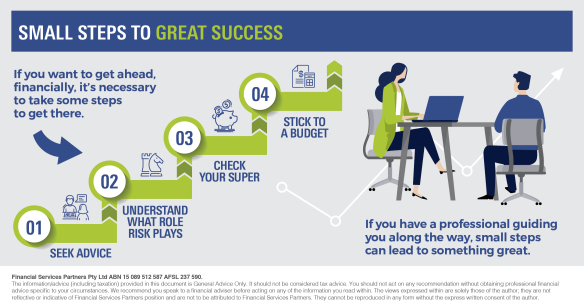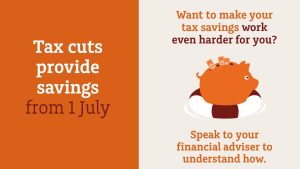If you want to get ahead, financially, it’s necessary to take some steps to get there. It may seem daunting and overwhelming but like anything, if you have a professional guiding you along the way, small steps can lead to something great.
Step 1 | Seek advice
It’s hard to achieve great success without a team of experts behind you and your wealth is no different. Getting professional financial advice means your adviser can work through a myriad of options with you and implement a strategy aligned closely to your financial goals. Retirement planning, tax-effective super strategies, investments and estate planning? Your financial adviser can help.
Step 2 | Understand what role risk plays
One of the first things your financial adviser will do is work out your risk profile, which they will check at regular review meetings. Why? Because risk is related to return, and this will help drive the recommendations they make to you in terms of your financial plan. Generally, the higher the risk, the higher the return. While some people like higher risk investments because they have the potential to deliver higher returns, others prefer less risky investments. It’s important to remember that markets are cyclical and shares are a long-term investment so if the market wobbles, your financial adviser is best placed to keep an eye on your investments and determine if they remain aligned to your overall financial strategy.
Step 3 | Check your super
Your superannuation could be your largest asset, other than your own home. Given it’s such a large sum that you have been contributing to for years and years, and you are relying on it to sustain you in your retirement, isn’t it something you want to get right? Sure, it’s a long-term investment, but it’s important that it is invested in-line with your risk profile and financial goals. And you DO have options. As well as your employer contribution, you can kick in a bit extra through salary sacrificing. Contributing more to super will not only boost your account balance, it could reduce the amount of tax you pay.
Step 4 | Stick to a budget
Sounds boring, right? But a budget is not boring, it’s empowering!! Setting a realistic budget helps you understand where your money is going, what can be trimmed and where you can invest to save for your future. Understanding your overall financial health and having a budget aligned to your financial goals gives you a real understanding of the benefits of working with a financial adviser. You can start to see a real change in your circumstances. Having a budget doesn’t mean giving up things you want, it just means you plan for them and you make sure you can afford them BEFORE you spend the money. Setting and sticking to a budget is really the simplest way to help you get ahead.
DISCLAIMER
Financial Services Partners Pty Ltd
www.financialservicespartners.com.au
ABN 15 089 512 587 AFSL 237 590. The information/advice (including taxation) on this website is General Advice Only. It has been prepared without taking into account any of your individual objectives, financial situation or needs. Before acting on this advice you should consider the appropriateness of the advice, having regard to your own objectives, financial situation and needs. You should obtain a Product Disclosure Statement relating to the products mentioned, and consider the statements before making any decision about whether to acquire products or services.
We take your privacy seriously and as such we, or any of the Financial Services Partners financial advisers, will never ask you to transfer money via email request unless we have spoken to you in person or the transfer is part of an existing arrangement between you and your financial adviser. If you receive any such requests that are outside the agreed arrangements you have with your financial adviser, please contact our office immediately to confirm the validity the request before you take any action – .
The views expressed in this publication are solely those of the author; they are not reflective or indicative of the Licensee’s position and are not to be attributed to the Licensee. They cannot be reproduced in any form without the express written consent of the author.







